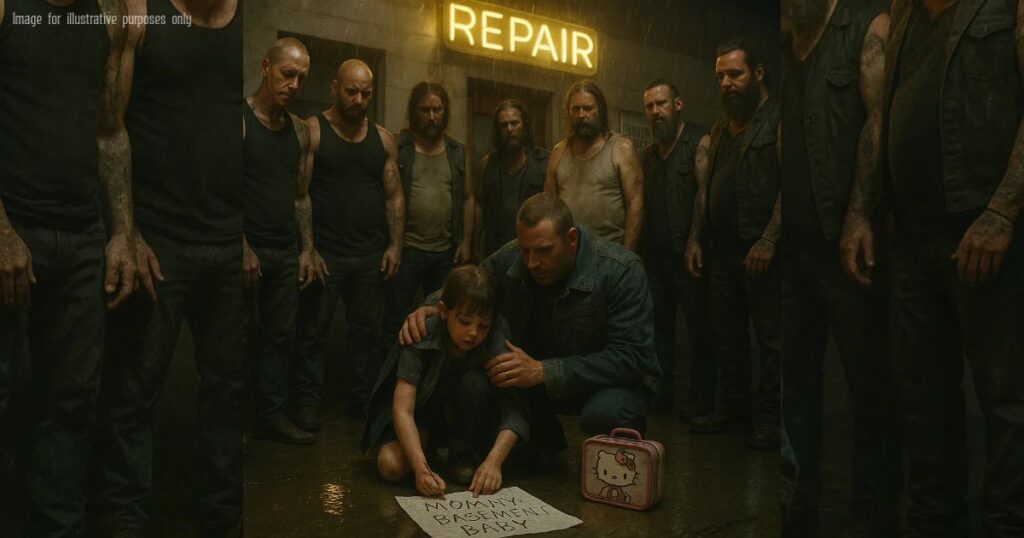She didn’t call 911—Mom whispered the man who locked her in the basement knew that line, and the baby wasn’t breathing. So she ran to the place with wings.
She kicked our shop door at 2:07 a.m., rain braided through her hair, a dented Hello Kitty lunchbox clutched like a life raft, and eyes that looked older than a storm.
The light above the sign buzzed and sputtered. Our place isn’t much to look at—a repair shop that smells like coffee and cold steel, with a soup line that starts before sunrise and a bulletin board fat with prayers and job postings. But on nights like this, it’s a lighthouse. Veterans who can’t sleep. Long-haul drivers between runs. A mechanic who owes tomorrow one good decision. A couple of former cops who paid for telling the truth. A man who learned patience the hard way. People who know something about getting back up.
She was shaking too hard to speak. When Mason—everyone calls him Church, because he has a way of making even chaos listen—knelt to see her face, she held up a crumpled page from a school notebook. In pencil, a child’s hand had drawn a door with a giant padlock, a stick figure with hair like a waterfall, and—above them both—two open wings.
Church’s voice went soft. “Hey, little bird,” he said, the way you speak to a stray that needs a hand but flinches from sudden motion. “I’m Church. What’s your name?”
Her mouth trembled. Nothing came out. Then she crouched, pressed the lunchbox to the concrete, and started drawing again. Red door. A little rectangle halfway up—broken doorbell. A tilted metal sign: BLUEBIRD REALTY in ghost letters. And, with a fist that balled around the pencil like it was a rope, she wrote three words, blocky and crooked, every letter shaking:
MOMMY. BASEMENT. BABY.
The room changed its shape. Wrenches stopped clinking. Boots quit scraping the floor. We had all seen different kinds of emergencies. This one felt like the kind that doesn’t give you second chances.
Doc—Nguyen, an ER nurse who knows the sound of a bad night over a phone line—stepped close, palms open. “He’s breathing?” he asked her gently, pointing to the stick-figure baby.
She swallowed, shook her head, then mimed a slow, shallow rise with her hand. Not breathing right. Not waking up.
Church put his palm to the concrete, as if to steady the whole building. Then he stood. “We move,” he said, not loud, but the way thunder sometimes happens far away and still rearranges something in your ribs. “Quiet. By the book.”
People like to think the word hero means louder, faster, more. That’s a fairy tale. The smartest rescues begin with a list.
“Switch,” Church said to the smallest guy in the room, who could take a busted toaster apart and show you three ways it always wanted to fail, “body cams and extra batteries. Record everything.”
“Hawk,” he said to the one with the drone case, “eyes up. Sweep every block around the old Bluebird properties.”
“Patch,” he told the biggest, softest soul among us, “your truck for the kid. Blanket, hot cocoa. Don’t ask questions, just keep her near.”
“Doc,” he said, “call the ER. Tell them we’re inbound with a woman who may be restrained and a baby with depressed respirations. Ask for peds and a warming bay. And please, tell them we’re going to try to keep chatter off the scanner until we arrive.”
He took out his phone and called Detective Serena Ruiz.
If there’s an opposite of lazy, it’s Ruiz. She answers even when she’s got one shoe on and a coffee that hasn’t learned it’s morning yet.
“Exigent circumstances,” Church said into the phone. “Minor in distress, possible unlawful confinement. Address incoming—soon as Hawk confirms.”
“Document everything,” Ruiz said. “You touch nothing you don’t have to. You move only who needs air.”
“Copy,” Church said. His voice didn’t change temperature. It never does, not when it matters.
The girl—later we’d learn she was Lyla—gripped his sleeve the way you hold on in rough water.
He took off his denim jacket and wrapped it around her shoulders. It swallowed her whole, and she let it.
Within five minutes, the drone’s feed glowed on a cracked laptop.
Hawk’s finger traced the nodal map he kept in his head of old landlord logos and half-forgotten LLC names.
“Warehouse district,” he said, zooming.
The roof of a squat cinder-block building peeled like a bad sunburn.
On the side, a tin sign no one had bothered to take down: Bluebird Realty in chipped blue cursive. The front door was painted the stubborn red of old barns. The camera snagged on a lopsided brass rectangle near the knob—doorbell, broken.
“Got it,” Hawk said. “Lights off. One car out front. No movement.”
Church looked at Lyla.
“This the one?” he asked.
She pressed her lips to her teeth, then lifted both hands like wings and nodded.
We rolled out.
Not sirens, not speed for the sake of feeling brave.
A line of engines purring low, a couple of pickup trucks, hazard flashers muted by rain. We cut our lights two blocks out. The streetlights hum in that part of town like they’re exhausted from holding back the dark.
Patch stayed with Lyla in his truck.
He let her talk by not making her talk.
She pulled a stubby pencil from the lunchbox and drew on an old receipt. Not pictures this time—letters. She wrote ELI and traced the E three times like she was trying to make it stronger.
Doc and I went with Church to the side door.
Switch toggled the cams and tapped his pocket where he kept extra batteries like they were talismans. Hawk took the drone up one more time to check the rear.
“Serena’s five minutes out,” Church said. “We document, we preserve, we get air into airless places.”


